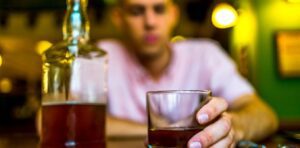Two glasses of wine might add more sugar to your diet than eating a doughnut

Soft drinks have been the focus of the UK government’s attempts to curb people’s sugar intake in recent years, but the same approach has not yet been applied to the sugar content in alcoholic drinks.
The government introduced “sugar taxes” on soft drinks in 2018, meaning manufacturers are charged a levy of up to 24p per litre of drink if it contains eight grams of sugar per 100 millilitres. This was done in order to attempt to reduce the public’s sugar intake in light of increases in childhood obesity.
But a new report from Alcohol Health Alliance UK has suggested that just two glasses of wine contains enough sugar to meet the maximum recommended daily intake level, even more than a glazed doughnut.
The report found that some bottles of wine contain as much as 59 grams of sugar per bottle. A standard bottle of wine contains 750 millilitres, which is equivalent to three large glasses of wine. This means in some cases a single large glass of wine can contain just under 20 grams of sugar, almost twice the sugar content of that glazed doughnut. So, when it comes to alcoholic drinks, how much sugar do they contain?
Consumption of sugar-sweetened drinks has been linked to an increased risk of weight gain and obesity, and associated conditions such as type 2 diabetes. Most research into sugary drinks has focused on soft drinks, such as colas. Alcohol, or ethanol to give it it’s proper name, is itself calorific.
Alcohol is second only to fats in terms of its calorie content per gram. On top of this potentially significant calorie content is the sugar that is contained in many alcoholic drinks. This includes the non-fermented starches and sugars found in beers and wines, or sugars added to some drinks such as cocktails or mixers to add flavour. It is unsurprising therefore that alcohol consumption has been associated with weight gain.
Sugar levels in cocktails
Surveys have reported that alcoholic drinks account for 10% of daily intake of added sugar in the UK for 29 to 64-year-olds, and 6% for the over 65s. This difference may be explained by the alcoholic drinks chosen by these different age groups.
Cocktails have high levels of sugar.
Cabeca de Marmore/Shutterstock
Near the top of the list of sugary drinks is likely to be the recent phenomenon of pre-made cocktails in a can, with some containing a staggering 49 grams of sugar per serving. Other more traditional cocktails also fare poorly when scrutinised for sugar content, a summer fruit cup cocktail, for example, may contain more than 25g of sugar per serving. This figure could be higher at home, depending on who makes the drink, and what is considered a serving. Having several of these cocktails won’t just make you merry, but will also provide more sugar than eating several chocolate bars.
Wine can vary dramatically in sugar content, with the seemingly healthier lower strength alcohol wines often having more sugar and therefore not necessarily being healthier. In general, dry wines or red wines generally have lower sugar levels.
Read more:
The science of sugar: why we’re hardwired to love it and what eating too much does to your brain – podcast
For those of us who enjoy beers and ciders, these drinks can contain even more sugar per serving than wine. A pint of cider, for example, contains more than 25g of sugar, with some ciders containing an eye watering 46g of sugar per serving.
Because spirits such as gin, vodka, whisky and rum are highly distilled their sugar content should be negligible. Without mixers, these drinks are clearly the healthiest in terms of both sugar and calorie content. The mixers they come with can however be sugar-sweetened so if you want to avoid sugar, having your gin neat or on the rocks is the best way forward.
Better labelling
It is clear that more can be done to alert people to the sugar content of alcoholic drinks. The first step would be to mandate that alcohol producers accurately label their products, not just with alcohol content by volume, but also sugar and calorie content, so consumers can make informed choices. Equally, altering the sugar levy to target alcoholic drinks more specifically would likely cause drinks manufacturers to alter their recipes to have less sugar content.
The levy on soft drinks has shown this can work, with significant reductions in consumption of sugar-sweetened non-alcoholic drinks since 2018. The government claimed that the tax on soft drinks resulted in more than 50% of manufacturers reducing sugar content in drinks between March 2016, when it was announced, and its introduction in 2018.
In the UK more than 20% of people regularly drink alcohol at levels that increase their health risk. People should also be aware of the less obvious risks posed by drinking alcohol, including the sugar content, and take this into account when choosing their tipple, especially if they are trying to lose weight.





